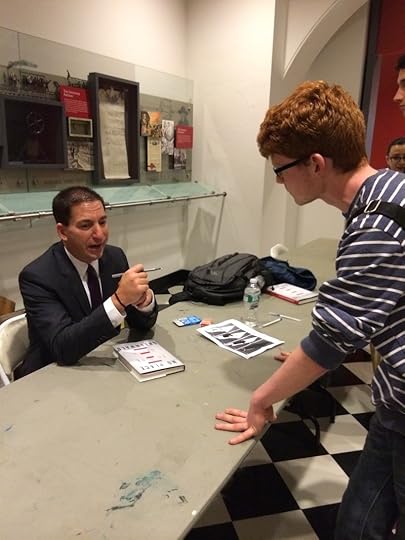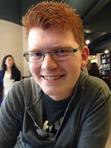Greenwald: Meeting a Model
In the past year, I've learned to temper my definition of a hero, as well as be incredibly selective about who I look up to and try and emulate. Tonight, I can honestly say that I got to meet one of my inspirations. Glenn Greenwald, widely known as the political journalist who broke the Snowden story in June 2013. I don't think it's remotely hyperbolic to say that the man embodies adversarial journalism in a way we haven't seen for many years. He was interviewed by Matt Taibbi about his new book and I had the pleasure enough to speak to him at the signing afterwards.

He spoke at length about journalism as an institution, and how many writers have become neutered but sitting as a budding student/digital rights activist in the audience, I was especially interested in what Greenwald had to say about encryption. Since the NSA singles out users who encrypt their e-mails, Greenwald advocated for encrypted e-mail to become the default, creating a logistical impairment for the NSA and reducing the (baseless) inherent suspicion of encrypted e-mail.
Our very own Student Net Alliance's Alec Foster asked what students can do to further the movement:
"I like when people ask me [about students protesting mass surveillance] because if I were to sit at an event for an hour and hear about these great injustices and the sort of corruption -- the problem is that there aren't easy answers. One of the things people have are choices all the time that define them and reflect their values. Y'know, you were saying earlier about how radical dissent is said to say something about your psyche and your moral state but acquiescence says something about that too, so that's always a choice people have every single day: 'Do I engage in dissent, or do I engage in compliance?" That's the choice Edward Snowden was faced with and he made that choice.
But I also think there's this whole war for students and for your energies. I mean, one of the amazing and interesting things is that the NSA is that it's this sprawling system that needs to control the internet [and so they need to recruit] people who know how to control the internet, know how the internet functions, they're people who grew up with the internet, the Edward Snowdens of the world. And so the irony of this is that they need to recruit the very culture that is most inclined to reject its authoritarianism."
As he signed my book, I told him that he'd inspired me to use PGP and to teach it to other journalism students. He looked up at me, his earnestness catching me off guard -- I must've been the hundredth book he signed. "That's what we need", he told me.



